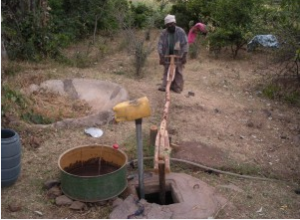 In sub-Saharan Africa, many farmers are already watching their crop yields dwindle as water becomes more scarce and difficult to access. Even in areas where freshwater is still available, technologies such as pumps and filtration facilities can be prohibitively expensive.
In sub-Saharan Africa, many farmers are already watching their crop yields dwindle as water becomes more scarce and difficult to access. Even in areas where freshwater is still available, technologies such as pumps and filtration facilities can be prohibitively expensive.
Maintaining food security in Africa, especially as climate change takes a bigger hold on the continent, will require finding inexpensive, sustainable ways of obtaining freshwater. Fortunately, some farmers have already found their solution by returning to an age-old practice of rainwater harvesting.
Rainwater usually infiltrates the soil and is retained within the first foot or so, but a significant portion is also lost to evaporation and runoff. Most sub-Saharan African nations are using less than 5 percent of their rainwater potential. Capturing even a fraction of rainwater can provide several gallons for consumption and irrigation at minimal cost.
In Rwanda, the World Agroforestry Centre of Nairobi, Kenya has collaborated with the country’s Ministry of Agriculture and Animal Resources to help farmers construct systems to funnel rainwater runoff into ponds lined with plastic sheets that can hold more than 30,000 gallons (113,562 liters). Farmers can then use simple, inexpensive siphons and foot pumps to collect this water for irrigation. Over 400 such ponds have already been built across ten districts and another 800 are slated for construction in the near future.
And in Kenya, the World Agroforestry Centre has been working with the United Nations Environment Programme (UNEP) to build cement tanks for Maasai women that collect water off of rooftops. These tanks provide a domestic supply of water that eliminates the burden of having to travel long distances to collect water every day—a burden often borne by young girls.
These water-saving initiatives are helping to improve food security and livelihoods in many parts of sub-Saharan Africa.
Contributed by Dan Kane. Photo credit: Bernard Pollack.

Danielle Nierenberg, an expert on livestock and sustainability, currently serves as Project Director of State of World 2011 for the Worldwatch Institute, a Washington, DC-based environmental think tank. Her knowledge of factory farming and its global spread and sustainable agriculture has been cited widely in the New York Times Magazine, the International Herald Tribune, the Washington Post, and
other publications.
Danielle worked for two years as a Peace Corps volunteer in the Dominican Republic. She is currently traveling across Africa looking at innovations that are working to alleviate hunger and poverty and blogging everyday at Worldwatch Institute’s Nourishing the Planet. She has a regular column with the Mail & Guardian, the Kansas City Star, and the Huffington Post and her writing was been featured in newspapers across Africa including the Cape Town Argus, the Zambia Daily Mail, Coast Week (Kenya), and other African publications. She holds an M.S. in agriculture, food, and environment from Tufts University and a B.A. in environmental policy from Monmouth College.








